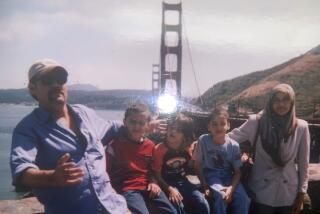U.S. Hostage Says He Saved His Life by Hiding Passport : Egyptian-Born American One of 12 Freed in Cyprus
LARNACA, Cyprus — One of the 12 hostages released from the hijacked Kuwaiti airliner is a U.S. citizen who said today he hid the fact, certain that the kidnapers would kill him.
Egyptian-born Mohammed Ramadan Ali, 43, gave the hijackers his Egyptian passport and hid his U.S. document in his briefcase after the plane was seized on a flight from Bangkok to Kuwait last week.
“Once they knew I had an American passport, I was sure I would be killed,” Ali told reporters at a Larnaca hospital.
Other passengers released from the hijacked jet on Tuesday before it went on to Algiers with 40 still aboard said that at least one of the hijackers boarded the plane after it had been diverted to Iran. Ali said the gunmen got a new supply of weapons there.
In interviews at Larnaca’s hospital or airport, the ex-captives said the Shia Muslim hijackers alternated kindness with violence.
Passengers Quizzed
Ali said the hijackers repeatedly asked passengers if there were any American citizens on board and if any of the passengers had ever visited the United States or studied there.
Ali, who became a U.S. citizen in 1978 but retained his Egyptian citizenship, said he kept quiet.
The released passengers included Ali, four Egyptians and three Jordanians in Western-style dress and four Kuwaitis wearing white robes and Arab headdresses.
Adnan Rashid Majiki, a Kuwaiti in his 60s, said the hijackers “were six but in Mashhad they became seven.” If correct, that would bolster Kuwaiti news reports that at least one additional hijacker joined the plane in Mashhad.
Two New Gunmen
“They changed the crew, you know, their team,” Ali told NBC-TV’s “Today” show. “One of them left . . . and another two guys came over . . . and they provided them with new weapons . . . and bombs . . . and ropes . . . and explosives.”
“We were asked about our religion, and how many children we had, and about our work,” said Saleh Ibrahim Malak, a released Kuwaiti in his 30s. The hijackers had said they freed hostages who were poor or who had many children.
“There were two handsome (gunmen) in their early 20s and two in their 30s,” he said. “The older ones had beards, looked aggressive and shabby.”
Koran Aided Release
An Egyptian, Sharif Mamdouh Badrawi, said his ordeal was aided by the Koran, the Muslim holy book.
“I feel as if I’m born again,” he said. “I read the entire Koran on the plane.”
Badrawi said scars on his hands were caused by a rope used to tie them up, but “despite the cuffs I could turn the pages of the Koran. (The gunmen) liked that and patted my shoulder.”
Mohammed Kamel Sayyid Rehan, 32, of Cairo said: “They used to tell us, ‘We will either all die together or live together.’ ”
“Yesterday, before they let us go, two hijackers appeared wearing napkins round their necks on which they had written, ‘Martyrdom Is Our Love.’ ”
Struck in Face
Rehan said, “I was hit on the face once when I locked the door of the toilet, something they told us not to do.”
But he said one gunman joked with the hostages and offered them cigarettes. Passengers released in Iran also said they were quite well treated, at least after the initial hours of the ordeal passed.
Rehan said the more elderly hostages were treated kindly, and so were three members of the Kuwaiti Royal Family still aboard the jet.
“The royals were treated very well, especially the women,” he said. “But their brother is the one who looks broken down psychologically. He asked for Maalox, he has stomach problems.”
More to Read
Sign up for Essential California
The most important California stories and recommendations in your inbox every morning.
You may occasionally receive promotional content from the Los Angeles Times.










